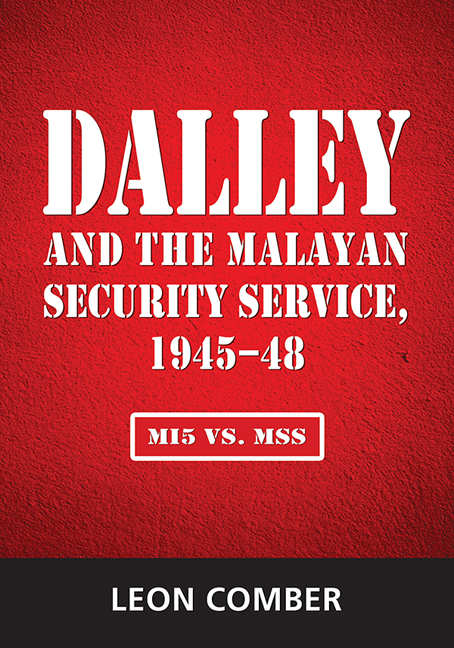Book contents
- Frontmatter
- Contents
- Preface
- Acknowledgements
- List of Abbreviations
- 1 Lieutenant Colonel John Dalley and the MSS: Early Days
- 2 Lieutenant Colonel John Dalley and Dalforce
- 3 The Establishment of “Security Intelligence Far East (SIFE)” in Singapore
- 4 Dalley's Return to Singapore
- 5 The Indonesian Situation and Malaya
- 6 Indonesian Encroachment into Malaya
- 7 Arrangements for Allocation of MSS Staff to Special Branch, Singapore, and Special Branch, Malaya
- 8 Conclusion
- Appendices
- Bibliography
- Index
- About the Author
4 - Dalley's Return to Singapore
Published online by Cambridge University Press: 12 February 2019
- Frontmatter
- Contents
- Preface
- Acknowledgements
- List of Abbreviations
- 1 Lieutenant Colonel John Dalley and the MSS: Early Days
- 2 Lieutenant Colonel John Dalley and Dalforce
- 3 The Establishment of “Security Intelligence Far East (SIFE)” in Singapore
- 4 Dalley's Return to Singapore
- 5 The Indonesian Situation and Malaya
- 6 Indonesian Encroachment into Malaya
- 7 Arrangements for Allocation of MSS Staff to Special Branch, Singapore, and Special Branch, Malaya
- 8 Conclusion
- Appendices
- Bibliography
- Index
- About the Author
Summary
Lieutenant Colonel Dalley returned to Singapore after the war on 5 February 1947 by the Empress of Australia from England. He was met at the wharf by some former members of Dalforce who had served under him in the battle for Singapore. Dalley asked them to gather around him and he told them:
This is the moment for which I have waited for many years — when I can see and talk to you again. The enemy we fought against has now been defeated but in the world, there are still many unseen forces that are causing unrest.
We must continue, each and every one of us, to maintain peace and security in this country, and I am sure that as in the past, so in the future, you will do your best to attain this end.
Many observers believed he was referring to the beginning of the Cold War (1945–90) and the rise of Communism after WWII as a result of the fundamentally different ideologies and interests between the Soviet Union and the West, which eventually spread to every part of the world. Thus, “Cold War”, as opposed to an “atomic hot war”, became a term used to indicate the struggle for the hearts and minds of the people between the competing political systems of Communism and Democracy. Essentially, in the Malayan archipelago and Indonesia in particular, this was emphasized to some extent by the power vacuum left by the sudden surrender of the Japanese at the end of WWII after the dropping of the two atomic bombs, but whether this is what Dalley had in mind when he spoke is unclear.
The long PIJ Supplements that Dalley wrote after his return to Malaya on “Malay and Indonesian Communists” and the “Indonesian Situation and Malaya” attached to the MSS Political Intelligence Journals nos. 5 and 10, which will be referred to later in this study, nevertheless confirm Dalley's growing awareness of the problems which MSS would have to face in dealing with the post-war security situation, including the long-standing threat posed to Malaya's security by Indonesian left-wing parties stirring up trouble with Malay left-wing parties to rise up against British colonialism in Malaya as the Indonesians had done against the Dutch in Indonesia.
- Type
- Chapter
- Information
- Dalley and the Malayan Security Service, 1945–48 , pp. 45 - 55Publisher: ISEAS–Yusof Ishak InstitutePrint publication year: 2018

